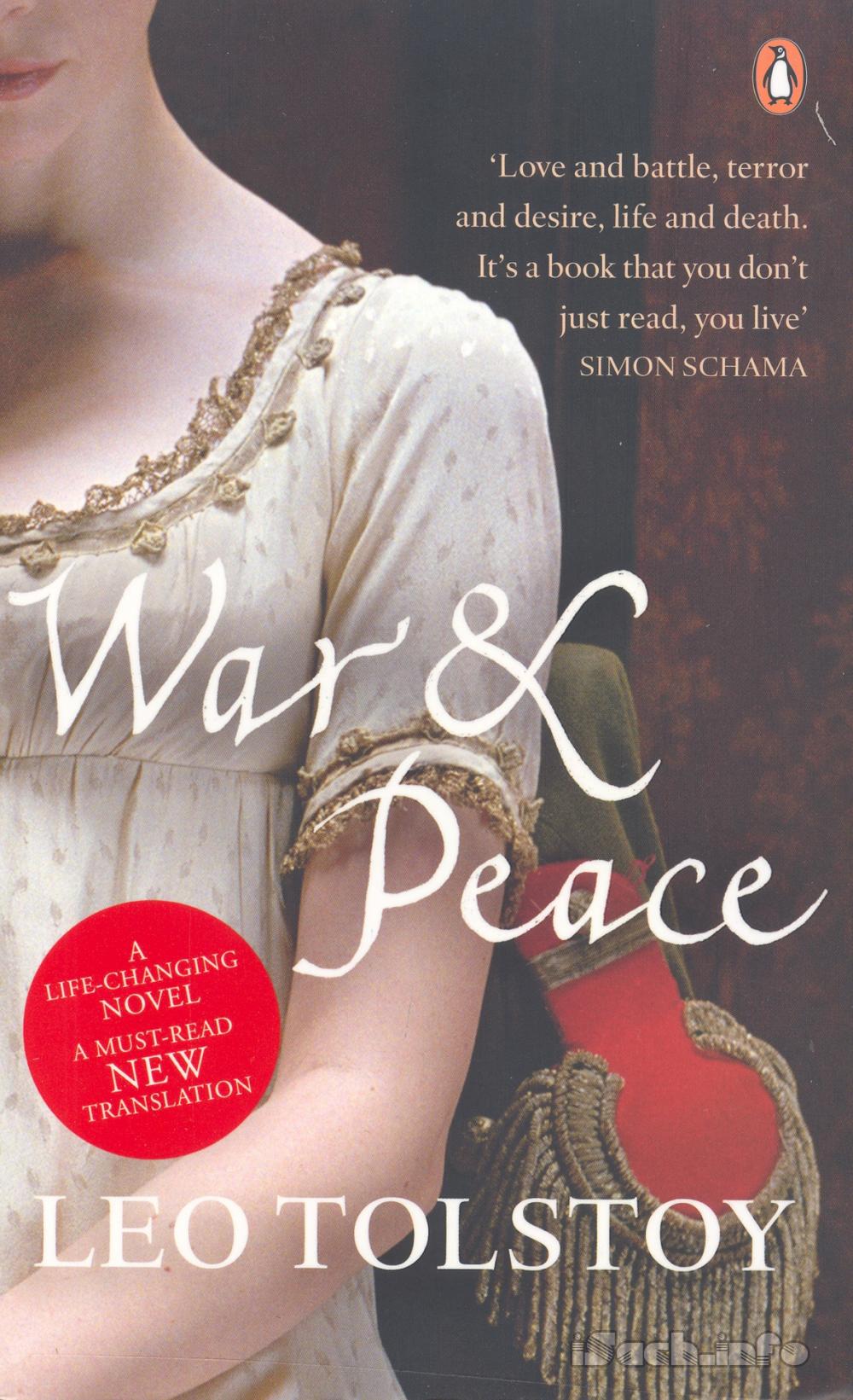Chapter V
T
he rain had stopped, and only the mist was falling and drops from the trees. Denisov, the esaul, and Petya rode silently, following the peasant in the knitted cap who, stepping lightly with outturned toes and moving noiselessly in his bast shoes over the roots and wet leaves, silently led them to the edge of the forest.He ascended an incline, stopped, looked about him, and advanced to where the screen of trees was less dense. On reaching a large oak tree that had not yet shed its leaves, he stopped and beckoned mysteriously to them with his hand.
Denisov and Petya rode up to him. From the spot where the peasant was standing they could see the French. Immediately beyond the forest, on a downward slope, lay a field of spring rye. To the right, beyond a steep ravine, was a small village and a landowner's house with a broken roof. In the village, in the house, in the garden, by the well, by the pond, over all the rising ground, and all along the road uphill from the bridge leading to the village, not more than five hundred yards away, crowds of men could be seen through the shimmering mist. Their un-Russian shouting at their horses which were straining uphill with the carts, and their calls to one another, could be clearly heard.
"Bwing the prisoner here," said Denisov in a low voice, not taking his eyes off the French.
A Cossack dismounted, lifted the boy down, and took him to Denisov. Pointing to the French troops, Denisov asked him what these and those of them were. The boy, thrusting his cold hands into his pockets and lifting his eyebrows, looked at Denisov in affright, but in spite of an evident desire to say all he knew gave confused answers, merely assenting to everything Denisov asked him. Denisov turned away from him frowning and addressed the esaul, conveying his own conjectures to him.
Petya, rapidly turning his head, looked now at the drummer boy, now at Denisov, now at the esaul, and now at the French in the village and along the road, trying not to miss anything of importance.
"Whether Dolokhov comes or not, we must seize it, eh?" said Denisov with a merry sparkle in his eyes.
"It is a very suitable spot," said the esaul.
"We'll send the infantwy down by the swamps," Denisov continued. "They'll cweep up to the garden; you'll wide up fwom there with the Cossacks"—he pointed to a spot in the forest beyond the village—"and I with my hussars fwom here. And at the signal shot..."
"The hollow is impassable—there's a swamp there," said the esaul. "The horses would sink. We must ride round more to the left...."
While they were talking in undertones the crack of a shot sounded from the low ground by the pond, a puff of white smoke appeared, then another, and the sound of hundreds of seemingly merry French voices shouting together came up from the slope. For a moment Denisov and the esaul drew back. They were so near that they thought they were the cause of the firing and shouting. But the firing and shouting did not relate to them. Down below, a man wearing something red was running through the marsh. The French were evidently firing and shouting at him.
"Why, that's our Tikhon," said the esaul.
"So it is! It is!"
"The wascal!" said Denisov.
"He'll get away!" said the esaul, screwing up his eyes.
The man whom they called Tikhon, having run to the stream, plunged in so that the water splashed in the air, and, having disappeared for an instant, scrambled out on all fours, all black with the wet, and ran on. The French who had been pursuing him stopped.
"Smart, that!" said the esaul.
"What a beast!" said Denisov with his former look of vexation. "What has he been doing all this time?"
"Who is he?" asked Petya.
"He's our plastun. I sent him to capture a 'tongue.'"
"Oh, yes," said Petya, nodding at the first words Denisov uttered as if he understood it all, though he really did not understand anything of it.
Tikhon Shcherbaty was one of the most indispensable men in their band. He was a peasant from Pokrovsk, near the river Gzhat. When Denisov had come to Pokrovsk at the beginning of his operations and had as usual summoned the village elder and asked him what he knew about the French, the elder, as though shielding himself, had replied, as all village elders did, that he had neither seen nor heard anything of them. But when Denisov explained that his purpose was to kill the French, and asked if no French had strayed that way, the elder replied that some "more-orderers" had really been at their village, but that Tikhon Shcherbaty was the only man who dealt with such matters. Denisov had Tikhon called and, having praised him for his activity, said a few words in the elder's presence about loyalty to the Tsar and the country and the hatred of the French that all sons of the fatherland should cherish.
"We don't do the French any harm," said Tikhon, evidently frightened by Denisov's words. "We only fooled about with the lads for fun, you know! We killed a score or so of 'more-orderers,' but we did no harm else..."
Next day when Denisov had left Pokrovsk, having quite forgotten about this peasant, it was reported to him that Tikhon had attached himself to their party and asked to be allowed to remain with it. Denisov gave orders to let him do so.
Tikhon, who at first did rough work, laying campfires, fetching water, flaying dead horses, and so on, soon showed a great liking and aptitude for partisan warfare. At night he would go out for booty and always brought back French clothing and weapons, and when told to would bring in French captives also. Denisov then relieved him from drudgery and began taking him with him when he went out on expeditions and had him enrolled among the Cossacks.
Tikhon did not like riding, and always went on foot, never lagging behind the cavalry. He was armed with a musketoon (which he carried rather as a joke), a pike and an ax, which latter he used as a wolf uses its teeth, with equal ease picking fleas out of its fur or crunching thick bones. Tikhon with equal accuracy would split logs with blows at arm's length, or holding the head of the ax would cut thin little pegs or carve spoons. In Denisov's party he held a peculiar and exceptional position. When anything particularly difficult or nasty had to be done—to push a cart out of the mud with one's shoulders, pull a horse out of a swamp by its tail, skin it, slink in among the French, or walk more than thirty miles in a day—everybody pointed laughingly at Tikhon.
"It won't hurt that devil—he's as strong as a horse!" they said of him.
Once a Frenchman Tikhon was trying to capture fired a pistol at him and shot him in the fleshy part of the back. That wound (which Tikhon treated only with internal and external applications of vodka) was the subject of the liveliest jokes by the whole detachment—jokes in which Tikhon readily joined.
"Hallo, mate! Never again? Gave you a twist?" the Cossacks would banter him. And Tikhon, purposely writhing and making faces, pretended to be angry and swore at the French with the funniest curses. The only effect of this incident on Tikhon was that after being wounded he seldom brought in prisoners.
He was the bravest and most useful man in the party. No one found more opportunities for attacking, no one captured or killed more Frenchmen, and consequently he was made the buffoon of all the Cossacks and hussars and willingly accepted that role. Now he had been sent by Denisov overnight to Shamshevo to capture a "tongue." But whether because he had not been content to take only one Frenchman or because he had slept through the night, he had crept by day into some bushes right among the French and, as Denisov had witnessed from above, had been detected by them.



 ePub
ePub A4
A4